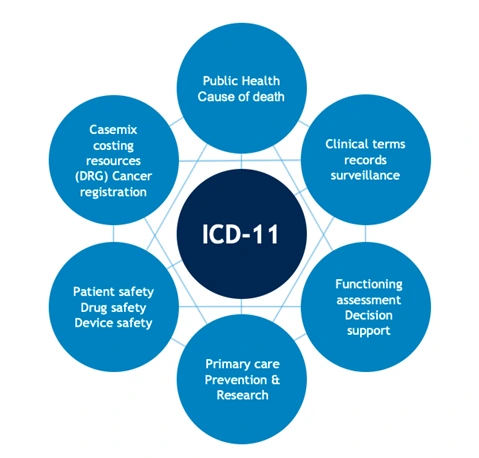Context:
Recently, the World Health Organisation (WHO) officially unveiled the International Classification of Diseases (ICD 11), Traditional Medicine Module 2.
Ministry of AYUSH Collaborates with WHO to Classify Ayurveda, Siddha, and Unani Diseases in ICD 11 TM-2 Module
- The Ministry of AYUSH in collaboration with WHO has prepared a classification of diseases used in Ayurveda, Siddha and Unani systems under the TM-2 module of the ICD 11 series.

What is ICD?
- ICD provides a common language that allows health professionals to share standardized information across the world.
- Developed by: WHO
ICD 11: Digital Evolution with 17,000 Codes, Inclusive Coding for Traditional Medicines”
- The eleventh revision contains around 17000 unique codes, more than 120000 codable terms and is now entirely digital.
- Under ICD 11, an international coding of terminology and the names and data of prevalent diseases of Ayurveda, Siddha, and Unani Medicine will be notified in the code internationally through the TM 2 module.
- Inclusion of Various Diseases: This international coding covers diseases like Malaria, insomnia, and Vertigo Guidance Disorder.
ICD 11 Significance: Strengthening Global Healthcare, Recognition, and Uniformity in Traditional Medicine
- Strengthening of the Healthcare System: It strengthens India’s healthcare delivery system, research, AYUSH insurance coverage, research and development, and policy-making systems.
- Global Recognition: It forms a link between traditional medicine and global standards and can be seen as a movement along with the global recognition of traditional medicine.
- The strategy for this was prepared from 2014 to 2023 and the first draft of the WHO strategy for Traditional Medicine for 2025 to 2034 has been prepared.
- Maintenance of Uniformity: It will lead to global uniformity in ASU (Ayurveda, Unani, and Siddha) medicine as a code of vocabulary defining diseases.
- Global Tradition: The indexing of disease terminology related to traditional medicine in ICD 11 proves to be a milestone in building a unified global tradition.
- Many member countries of the WHO have expressed interest in adopting a similar format to include traditional medical disease terminology in the ICD 11.
Traditional Medicines in ICD 11: Blending Cultural Wisdom with Modern Healthcare Standards
- As per WHO, traditional medicine is the sum of knowledge, skills, and practices based on the theories, beliefs, and experiences indigenous to different cultures.
- These have been used over time to maintain health, prevent diagnosis and treat physical and mental illness.
- The Traditional Medicine Chapter within the ICD 11:
- It is a formative step for integrating Traditional Medicine conditions into a classification standard used in conventional medicine.
- WHO may develop additional modules classifying other prominent forms of Traditional Medicine in the future, provided that specific requirements (e.g. existing national classification and terminology standards and use cases) are met.
- Module 2 is associated with Ayurveda and related Traditional Medicine diagnostic systems.
|
News Source: PIB
![]() 12 Jan 2024
12 Jan 2024

